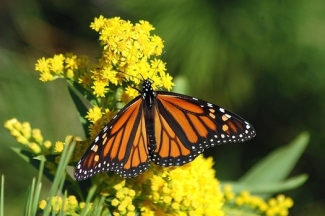
By Kevin Patrick Allen, Public News Service
Photo: Pollinators such as Monarch butterflies, certain birds and bats are an integral part of the health of natural ecosystems and agriculture. (Bill Barlow/Pixabay)
October 20, 2017 (St. Louis) - If you've ever watched the process of a caterpillar becoming a vividly colorful Monarch butterfly, you probably have an appreciation for a challenge being issued by the National Pollinator Garden Network.
The Million Pollinator Garden Challenge calls on everyone from horticulture professionals to schoolchildren and volunteers to help create and register one million pollinator gardens by the end of this year.
Pollinator declines in recent decades have been extreme, and Mary Phillips, the senior director of the National Wildlife Federation's "Garden for Wildlife" program, says Monarch populations have plummeted 90 percent in the last 20 years.
"Monarchs are something people identify," she says. "It's an iconic butterfly that many of us have experienced in our childhood. So, that's been an amazing motivator to get people to focus and engage around the pollinator issue."
National Garden Clubs, which is headquartered in St. Louis, is among the organizations joining in to encourage people from all walks of life to create their own pollinator gardens. Habitat loss, parasites and pesticides are among the causes of pollinator declines. Phillips notes that a Cornell study found one-third of all the food we eat is the direct result of pollinators.
Phillips says the Garden for Wildlife program helps not only wildlife but also gives people a daily connection to the natural world, whether they create a garden in the city or the country.
"It's very small to very big," she adds. "Some of these are creating tremendous acres of habitat and others are kind of connecting corridors across urban settings. So, both of those approaches are equally valuable."
Million Pollinator Garden Challenge participants can learn more and register their pollinator gardens online, plus they can take a look at the Challenge Map.







Comments
MONARCH JOINT VENTURE IOS & ANDROID APP
https://monarchjointventure.org/our-work/partner-projects/monarch-sos-ci....